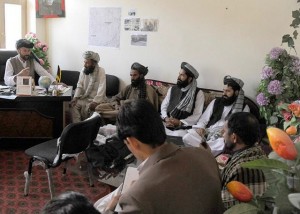Afghanistan: Khost Mullah Tours Province In Name Of Peace
Mullah Shah Mohammad, Director of the Khost Ulema Council – the province’s most influential religious committee – travelled to Sabari, Bak and Terezayi Districts of Khost Province April 7 to meet with local mullahs and tribal leaders, advocating national peace and reintegration efforts with the unifying tenets of Islam.
“It’s our responsibility as teachers to support the peace and reintegration effort and support the government,” Mullah Shah Mohammad said. “We need to bridge the gap between us and the Taliban with Islam. If we are not united, then we will always be a country dependent upon others.”

He pulled no punches, urging Afghan leaders to be proactive with initiatives to better the lives and infrastructure of their community.
“We must get rid of the fighting and build our own country and assist the foreigners to build it with us,” the director said, referencing coalition forces.
The meetings allowed for open and honest dialogue between not only Mohammed and his travelling partners, including the Mujahedeen Council director, Zadar Zadran, but also the heads of local madrassas.
One of the mullahs from Bak, an influential figure in the district, responded openly to the appeals of the Ulema Council director, said “The Ulema in Bak all agree we want peace and an Islamic government. We want our brothers to live well in this country.”
The focus of the three meetings centered on improving relations with the government and on taking action.
One madrassa teacher said, “It’s against Islam to harm each other. Some people say they are good Muslims, but you have to look at what each does.”
Zadran concluded with a hopeful sentiment of cooperation for the future, “All the problems we have, we will solve together.”
